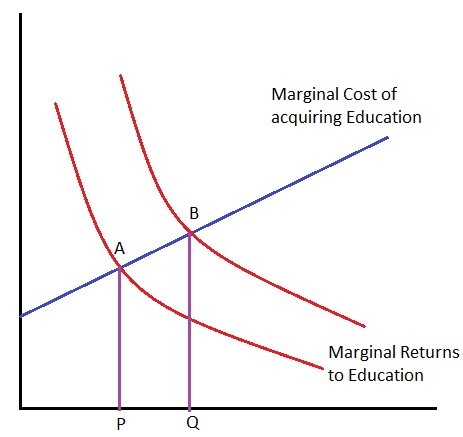
 Data Structure
Data Structure Networking
Networking RDBMS
RDBMS Operating System
Operating System Java
Java MS Excel
MS Excel iOS
iOS HTML
HTML CSS
CSS Android
Android Python
Python C Programming
C Programming C++
C++ C#
C# MongoDB
MongoDB MySQL
MySQL Javascript
Javascript PHP
PHP
- Selected Reading
- UPSC IAS Exams Notes
- Developer's Best Practices
- Questions and Answers
- Effective Resume Writing
- HR Interview Questions
- Computer Glossary
- Who is Who
Meaning and Impact of Human Capital on Economic Growth
Introduction: What is Human Capital?
Human capital refers to the economic values of quality and ability of labor that impact productivity. In other words, human capital means the stock of skills, expertise, abilities, and knowledge in a country at a certain point in time. Usually, human capital is concerned with the intangible assets and qualities of human beings that improve individual performance and benefit the economy. Investment is needed in human capital to produce more human capital.
Nations rely on human capital for the improvement of the economy and the creation of more human capital. There should be enough availability of educators, and other specialists in an economy. In other words, there should be the availability of enough human capital, such as doctors, engineers, professors, etc. in an economy. These specialists act as human assets and contribute to the creation of more assets at a later period of time.

University of Chicago economists and Nobel Prize winners Gary Becker and Theodore Schultz were the first to realize that the investment in employees was similar to the investment in capital equipment which is a factor of production. Both of these are assets that generate income and provide outputs.
Becker found that there were two types of human capital -
Specific human capital that is referred to training and education that benefited only one company.
General human capital benefited the individual at any company.
Becker stated that companies were more interested in providing specific human capital because general human capital had the disadvantage of employees being poached by competitors.
Examples of Human Capital
Human capital means any human quality or value that contributes to the growth of the economy and its productivity. It is usually hard to quantify human capital because they are intangible assets, but they consistently lead to the enhanced economic performance of a country.
Human capital can include attributes such as -
Technical or on-the-job training
Education
Mental and emotional well-being
Health
Punctuality
People management
Problem-solving
Communication skills.
Investment in human capital improves the skills and abilities of the labor force, resulting in higher income for the individual and greater productivity and output for the economy.
Human Capital and Economic Growth
Human capital is a predominant reason for accelerated economic growth. The nations that invest in human capital get rewards more than those that don't.
Investment in human capital provides ample opportunities and advantages to countries to go ahead economically. This happens because investment in human capital provides the best conditions for work and lifestyles.
Having experienced, high-quality human capital in fields, such as medicine, education, health, management, science, etc. ensures that the growth of the economy remains stable and constant. The main subject of growth in these fields due to investment is definitely human beings, but at present, the principal component of the process is an educated, creative, and resourceful person who has a high level of professionalism.
As human capital is the main reason for the creation of national wealth, analysts consider human capital as the single most powerful component for the economy to rise above the general standards.
Human capital has the ability to grow the economy exponentially provided there is enough focus on the required sets of skills that are a part of education in an economy.
Therefore, instead of providing skills randomly, a proper procedure for enhancing human capital is to provide skills that are needed most in an economy. If a proper strategy and procedure are followed, human capital can become the moving force of development and a major reason for economic, technological, and scientific progress.
Impact of Human Capital on Economy
The impact of human capital on economies can be discussed under the following attributes.
Rise in production
Investment in human capital leads to better productivity via the growth in the levels of GDP. As the skillset of individuals goes up, the production cost comes down and productivity levels increase. This leads to a rise in production as the skills that increase productivity become available.
Innovation, invention, and improvement in technology
Investment in human capital means there would be more inventions. Also, as the skills become optimum, there is an opportunity to have more innovations. These factors, when combined, offer a bountiful of opportunities for the economy to grow. In other words, human capital rewards improvement in technological domains through inventions and innovations, making economies stronger and offering opportunities to people to have a better lifestyle.
Improving the quality of life
The quality of life is usually measured by the income and health status of individuals. Investment in human capital increases resourcefulness in these domains. As health and income increase, people opt for better standards of living. So, human capital impacts the quality of life positively.
Higher physical productivity
Human capital offers the opportunity for companies to have better-skilled people to run physical equipment, like machines and other equipment. As the skills for using such equipment become available, the physical productivity of companies goes up. This increases the overall economic impetus of the working community.
An increasing rate of participation and equality
Investment in human capital increases the productive measures of the labor force. This increases the rate of participation among the workers. In other words, as the skillset and quality of the working force increase, their participation in productivity goes up. This makes the rate of participation stronger while decreasing the gap between the rich and the poor.
Key Takeaways
Human capital refers to the economic values of quality and ability of labor that impact productivity.
Human capital means the stock of skills, expertise, abilities, and knowledge in a country at a certain point in time.
It is usually hard to quantify human capital because they are intangible assets, but they consistently lead to the enhanced economic performance of a country.
Human capital is a predominant reason for accelerated economic growth. The nations that invest in human capital get rewards more than those that don't.
Investment in human capital ensures the growth of an economy. It improves working conditions and lifestyles by infusing more knowledge into the production process.
Conclusion
It is important to nurture human capital because it leads to the growth engine of an economy. If the process of human capital formation decreases, economies will suffer irreparable losses. That is why it is important to learn about human capital and its uses in the process of economic growth.
FAQs
Qns 1. What is meant by human capital?
Ans. Human capital refers to the economic values of quality and ability of labor that impact productivity. In other words, human capital means the stock of skills, expertise, abilities, and knowledge in a country at a certain point in time.
Qns 2. Is it always possible to quantify human capital?
Ans. It is usually hard to quantify human capital because they are intangible assets, but they consistently lead to the enhanced economic performance of a country.
Qns 3. Give three examples of attributes of human capital.
Ans. Human capital can include attributes like
Technical or on-the-job training
Education
Mental and emotional well-being.

